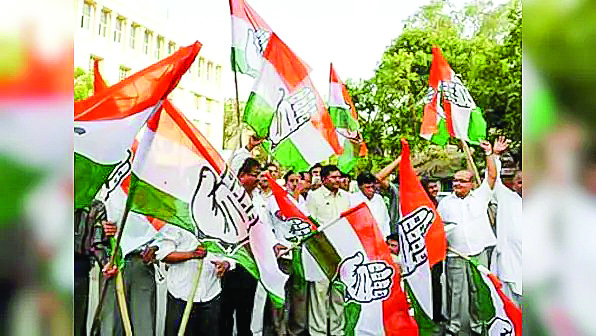After the initial heady euphoria experienced by the Congress celebrating a crushing 2019 defeat turned into a modest loss, has died down and the unsettling depression afflicting the BJP from a less than expected outcome has passed, a reality check is vital. Despite all the hoopla about a moral victory and a moral defeat, the verdict at the end of the day is crystal clear: the NDA and the BJP scored an unequivocal victory over the I.N.D.I.A bloc with a sizable 63-seat difference between the winner and the loser. The BJP tally alone surpassed the combined total of the I.N.D.I Alliance—a “ combination of disparate parties glued together solely by a hatred for Narendra Modi and a drivefor power bereft of any practicable agenda for the nation.
An examination of the numbers gives one further clarity of what the results indicate. The Congress Party won 99 seats with a vote share of 21.2%. In relation to the 44 and 52 seats that the Congress won in 2014 and 2019 respectively, this appears like an impressive recovery but when viewed objectively against the broader picture, it is hardly so. First the inability to reach even the 100-mark is a setback for a party that for nearly 50 years strode the Indian political scene like a Colossus. Second, in terms of vote share and the number of seats won, the Congress performance in 2024 when compared against its own track record over the last 10 Lok Sabha elections ranks as the third lowest.
India consists of 28 states and 8 union territories. Of the 21 larger states (states with more than 2 LS seats), the Congress failed to win a single seat in 4 (Madhya Pradesh, Andhra Pradesh, Himachal Pradesh and Uttarakhand) and barely managed to win one seat in the states of West Bengal, Odisha, Gujarat and Chhattisgarh—a total rejection by the electorate. In addition, in 2 bigger UTs (J&K-5 seats, NCT-7), the Congress party also drew a blank. The Congress reached double digits in only two states: Kerala and Maharashtra. In comparison, it was only in one larger state (Tamil Nadu) that the BJP did not register a win. There can be only one interpretation from these results: the Grand Old Party remains a rump organization with its influence restricted to selected pockets.
In contrast, the BJP made impressive gains in Odisha, winning 20 of 21 Lok Sabha seats and capturing the State Assembly for the first time. Couple this with the increasing vote share in the southern states of Tamil Nadu and Kerala and all point to the growing pan-India acceptance of the BJP. This election belies the myth that the BJP is a party of the North and the Hindi heartland.
Analysis of the vote shares reveals another reality. The Congress vote share rose to 21.2% from 19.6% in 2019—a gain of 1.6%. The vote share during the 2014 elections was 19.5%. This translated into a disproportionate 47% seat increase that accounts for the mismatched optics. Therefore, it is far-fetched to claim that this minimal vote share increase of 1.6% signifies a resurgence of the Congress Party or represents a significant turnaround.
To appreciate a real turnaround, one needs to examine the track record of the BJP. In 2014, when the BJP came to power after a hiatus of 10 years and a poor showing in 2009 (116 seats with a vote share of 18.8%) its vote share skyrocketed to 31.2%, a gain of 12-13%. Since then, the BJP has not looked back. Its vote share increased to 37.7% in 2019 and fell marginally by 1% in this election. The point to note is that the BJP vote share in 2024 is still at least 5 percentage points above its 2014 level. This clearly suggests that its vote share is intact and has suffered minimal erosion.
Compared to an aspirational target of 400, a 240-seat count is underwhelming. Nevertheless, an objective assessment suggests that even this figure of 240 is a commendable achievement. In the last 40 years since Rajiv Gandhi’s sympathy driven landslide victory, not once has the Congress Party breached the 240-mark: the closest it has come to this number was in 1991 when it got 232 seats.
Conjectures regarding the BJP’s setback are galore. Misinformation about the Constitution and rumours that the BJP intended to do away with reservations may have stoked concerns among the Dalits causing them to vote against the BJP. More importantly, what warrants scrutiny is the self-goal that the BJP scored in Maharashtra. A robust long-standing ideological alliance between the BJP and united Shiv Sena was sacrificed to appease the ambitions of its local leaders: a strategic blunder that failed to factor its impact at the national level. The BJP-Sena alliance in 2019 had won 42 of the 48 seats in Maharashtra; Had the alliance been retained it would have countered the unexpected losses from UP and brought the BJP closer to the majority mark.
In conclusion, a desperate Congress Party is clutching at straws. Its vote share has shown only minimal improvement, it has no electoral presence in large swathes of the country and its increased seat tally is the result of a fragile, opportunistic coalition and could dissipate anytime. AAP has already distanced itself from the Congress in Delhi.
The BJP too has suffered a setback, but it is not as crippling as the post-result narrative has made it out to be. This close-call may be a blessing in disguise for the BJP to introspect and take corrective measures. The BJP’s vote share is still robust and intact and remains 5 percentage points above its 2014 vote share. Re-engineering its strategy and a sensible approach to alliance-making may propel it to greater heights.
Who knows what the BJP aspired for in 2024 may become a reality in 2029 if the party works hard with dedication and sincerity to alleviate the problems of all Indians over the next 5 years and approaches the electorate with humility rather than hubris.

